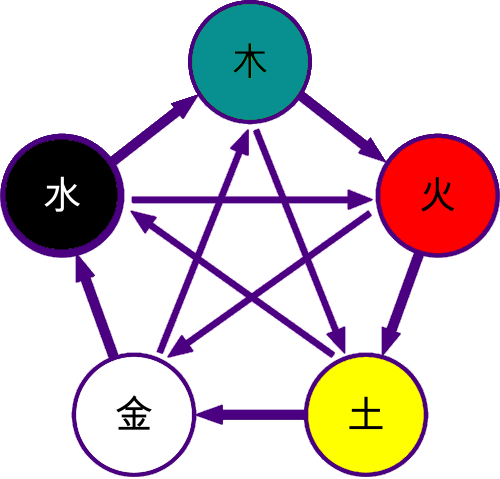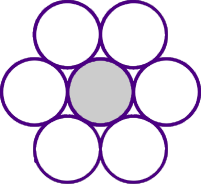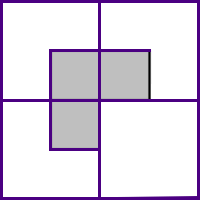Why?
Why is seven so ubiquitous in most cultures? Why not six? Or eight?
The answer is simple:

In the earliest civilisations, man realised there is more to life than his own little world. He looked at the biggest and brightest physical entities as the most important and highest powers.
The sun is one obvious power and was worshipped as a god. The moon is also pretty big, mysterious and powerful, and that too was considered to be a god.
In fact all the celestial bodies were considered deities, and as far as the ancients were concerned, there were seven such celestial bodies. They were so great and powerful that they not only influenced human affairs and personalities but also supernatural things such as luck and fate.
Later, more heavenly bodies could be seen by telescope but by that time, civilisations were already committed to the seven gods. When 'time' was being measured by astrologers and astronomers, seven became the number of days in the week (see days-months-seasons).
Ancient religions adopted this number: the Egyptians had seven gods, Parsees seven angels, Persians seven sacred horses, and Phoenicians seven mysterious kabiris gods. (The kabiris were so mysterious that the Phoenicians didn't know for certain how many there were, but they believed seven nonetheless.)
It's not surprising, therefore, that the number seven is still ubiqitous in later religions, both major and minor. These include:
...as well as numerous ideologies and other belief systems.
See Seven in religion.
Some natural phenomena support the notion that seven is important. For example, the moon changes phase every seven days and seven phases of the moon are visible.
We see seven colours in the rainbow and the seven musical notes of the diatonic scale (do, rei, me, fa, so, la, te) are considered the most pleasing to the human ear.
Depending on whether it's a weekday or week-end, the average person falls asleep in seven minutes and sleeps for around seven hours.
The number seven even appears in bizarre coincidences between Presidents Lincoln and Kennedy.
There are seven continents (Europe, Asia, Africa, North America, South America, Australia, and Antarctica).
We refer to the Seven Seas and there are Seven Wonders of the Ancient World.
All the above can be refuted, and you'll see below that seven is no more a 'natural' number than any other. But it's popular anyway, especially by numerologists, who regard many numbers as 'special'.
For example:
The material and the spiritual. The human and the divine.
And the animals went in two by two. Before the great flood, God instructed Noah to load up two of each kind of animal.
The two Onmyō primal opposing but complementary forces found in all things in the universe.
Well, perhaps not all things in the universe. Gravity, for example. And there are lots of this in the middle, such as the colour grey.
As for the two-by-two animals, perhaps you didn't knoah that actually there were seven of each type. See Gen. 7:2-3.
In science
The three-legged tripod: geometrically the most stable structure.
In Christianity
The Holy Trinity of God (Father, Son and Spirit) and the three Theological Virtues (faith, hope and love).
In China
Heaven, earth and mankind. This was coined by the Triad, a general term for branches of Chinese underground organizations based in Hong Kong, Taiwan and mainland China, and spreading out to Chinese communities around the world. These societies were originally formed in the Qing Dynasty to resist the Manchu Emperor. The name 'Triad' (Sanhehui) meant 'Three Harmonies of Society' – unity of heaven, earth and mankind.
In Texas
The Three Kick Rule.

Four appears in natural phenomena, and in particular the four seasons, which symbolise completeness. (Climate change will force us to refine seasons, but probably we'll still refer to spring, summer, autumn and winter.)
The four cardinal directions of north, south, east, west and the four 'corners' of the earth, similarly symbolising completeness.

In China, the Five Elements
In Chinese, qing is a word used for both green and blue, and the same is the case in Japanese with the word aoi. So on the 5 elements image we're using a blue/green blend.i
A combination of all colours in the colour spectrum gives us white light. And if you mix paints of all those colours in a palette, you get black paint.
The ancient Chinese understood the universe to be based on these five colours (which changed over the years) and they associated 'elements' with these.
Complementing the seven musical notes of the diatonic scale, the five notes of the pentatonic scale are also considered the pleasing to the human ear.
(By the way; If one's lonely, two's company, and three's a crowd, then what's four and five?
(The answer's at the bottom of this page.)


Six is the only number that is both the sum and product of three consecutive positive numbers.
Six is the only number of similar coins that can be arranged around a central coin of the same radius so that each coin makes contact with the central one, and touches both its neighbours with neither a gap or overlap. Similarly the six-sided cells of a beehive.
And that raises the question: How did the bees know?
888 is the sum of 8 consecutive prime numbers (97 + 101 + 103 + 107 + 109 + 113 + 127 + 131).
Our Hindu-Arabic numeral 8 is a never-ending line, like the lemniscate, the symbol for infinity ∞.
The numerical value of the name of Jesus in Hebrew is 888, a 'super number'.
There are eight beatitudes (Matt. 5:3-11) and 8 symbolises regeneration for many religious ideas. It is the holistic number in Buddhism for the number of steps to end suffering.
And so on.
Eleven is so magic and powerful that it brought about the end of WWI and made a good contribution to the next one. Now that's some pretty powerful magic!
Read about it on our tongue-in-cheek Eleven page, and see also how eleven caused the 9/11 attack on the World Trade Center and the devastating 2004 Indian Ocean tsunami. (Conspiracy theories; the refuge for the feeble minded.)
The Grim Reaper is shown on the 13th card in most tarot decks. It means death, or new life, or something in between, or whatever you want it to mean. Only he, the Grim Reaper himself ("he"?), understands what 13 really means, though it's not clear why an angel of Hades has to rely on any number which is an abstract object created by the human mind.
No need to overthink that point.
Lucky or unlucky depends on whether you are the seller or buyer of a 13-year-old 1300 cc car with 130,000 miles on the clock.
On 23 June 2018 a schoool football coach and twelve boys (average age thirteen) went for a celebration party in the Tham Luang cave in Thailand. Four kilometres (2.5 miles) from the cave mouth they became trapped by floodwater. It took over a week for rescuers to find the group of thirteen and more than another week before the massive rescue operation were able to extract them.
The amazingly complex and nail-biting rescue operation captured the world's attention and "13" became a lucky number in Thailand; especially so for Songpol Kanthawong and Tsaweechai Namsang, both aged thirteen, who had been unable to take part in the trip.
The opinions of the superstitious are their own. The rest of the world, however, are just happy that the boys went home.
One well-known repeating number is 666 – the mark of the beast.
But back to seven.
In (chiefly British) slang, to "knock seven bells" out of somebody is to give them a good beating, although why any beating should be called "good" is not clear.
The phrase is believed to originate from the nautical system for lookout watches, which last for four hours. Every 30 minutes, a bell is struck to inform the next watchman to take over, and the eighth bell signals the end of the watch. The seventh bell is, therefore, near the end of the watch. So to knock seven bells out of somebody is to beat them to within an inch of their life (another curious idiom, which really means within an inch of death), and seven becomes a lifesaver.
Seven is not always lucky:
As at the date of writing (18 July 2014), the cause of either disaster had not been determined, but the consensus is human failure, rather than mechanical failure, design failure, or anything supernatural.
Whilst seven is just a mathematical object we have manufactured. and not naturally or supernaturally special, our culture has made it special.
Even in corporate culture, the number is popular. 'Seven Principles of Good Practice' frequently pops up in Mission Statements and Harrods staff in London are required to perform 'Seven Steps of Exceptional Service'. And if you're reading this page when you should be working, check out Seven steps for dealing with procrastination)
The common misconception that seven is 'lucky' has not escaped the attention of marketing people. Take for example the prominent Seven in the badge of the Seven-Eleven convenience store founded in 1927. See Seven in Commerce for seven other famous brand names, all of which have been hugely successful.
The number seven is popular in literature:
and a few others. (We also wanted to mention Grimms' Fairy Tales 'Snow White and the Seven Dwarfs', 'The Seven Swabians', 'Seven Ravens', but decided to limit the above list to seven titles.)
A quick analysis of the Grimms' Fairy Tales, since those stories are riddled with numbers, reveals that seven is more common than neighbouring numbers:
| six/sixth/sixty | 90 times |
| seven/seventh/seventy | 161 times |
| eight/eighth/eighty | 24 times |
Seven is also a significant number in Christian literature, Jewish literature and the literature of many other religions. And seven does appear in the Bible much more frequently than adjacent numbers:
| six/sixth/sixty | 199 times |
| seven/seventh/seventy | 320 times |
| eight/eighth/eighty | 117 times |
(See Seven in the Bible)

Yes, the average person may fall asleep in seven minutes and sleep for around seven hours, but we must be cautious in saying this is 'natural'. Primitive man had a completely different lifestyle to ours today and no doubt he had a different sleep pattern.
'Seven' may be the smallest positive integer requiring two syllables in English yet the English language, as we all know, is full of quirks.
And the opposite sides of a six-sided die always totalling seven might be mildly interesting, but it doesn't contribute much to life, unless you are a gambler. Seven is the most common combined number of two rolled dice because of statistical probability; there is nothing supernatural about it.

Seven continents, yes, but only in recent history. The planet's land mass above sea level is constantly shifting, merging and splitting, rising and sinking. In the Permian Period (about 250 million years ago) there was effectively just one continent (a pretty big one) and one ocean (even bigger).
Seven seas? Open an atlas and start counting; you will soon find more than seven seas in the world.
There are more than seven celestial bodies. Had there been eight planets visible to the naked eye, no doubt we would have eight days in the week, have an eighth 'Sea' and an extra Wonder. If we take even a cursory look at nature, we see there are an infinite number of wonders.
The moon does change phase every seven days but that is just earth's moon. Countless other planets have moons, each with their own particular behaviour.
Yogis will agree that man has more than seven 'aspects', and these overlap. There are not seven colours in the rainbow; there are six main colour bands and an infinite number of hues. And there are not seven musical notes of the scale in all cultures. Seven was chosen to grade and measure such things, because that's a number we've become comfortable with.
We think we see seven colours, but actually we don't – as explained here
On 6 July 2013 (month 7) Asiana Airlines Flight 214 (2+1+4=7) crash landed at San Francisco with 307 passengers. Despite the huge fireball, 305 passengers survived. The cause may have been a result of the inexperienced pilot's error, flying well below the target landing speed of 137 knots per hour, or 157 mph. Seven seconds before the crash, the pilot recognized the need to increase speed. But sadly, that was too late.
Gravity pulls but doesn't push. Or does it? Quantum field theory says gravity is transmitted by (hypothetical) elementary particles called gravitons. There might well be an opposite particle waiting to be discovered; we just don't know.